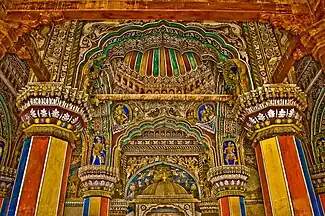Thanjavur Maratha Palace
The Thanjavur Maratha Palace, known locally as Aranmanai, today is the official residence of the Bhonsle family that ruled Tanjore from 1674 to 1855.[1]
 Interior of the Durbar Hall of Thanjavur Maratha Palace | |
| Location | Tanjore region, India |
|---|---|

History
The Thanjavur Maratha palace was originally constructed by the rulers of Thanjavur Nayak kingdom. After the fall of the Thanjavur Nayak kingdom, it served as the official residence of the Thanjavur Marathas. When most of the Thanjavur Maratha kingdom was annexed by the British Empire in 1799, the Thanjavur Marathas continued to hold sway over the palace and the surrounding fort. The Bhonsle family continued to hold on to the palace even after the last king, Shivaji of Thanjavur.
Constituents
The palace complex consists of the Sadar Mahal Palace, the queen's courtyard and the Durbar Hall. The Royal Palace Museum contains a splendid collection of Chola bronzes. The Raja Serfoji Memorial Hall and the Royal Palace Museum are situated in the Sadar Mahal Palace. There is also a small bell tower. The Saraswathi Mahal Library is situated with the Thanjavur palace complex. The Chandramouleeswarar temple also is located within the premises.[2]
Gallery
 Murral of Rama Pattabishekam in the Darbar hall.
Murral of Rama Pattabishekam in the Darbar hall. Elephant goads at the Thanjavur Maratha palace
Elephant goads at the Thanjavur Maratha palace Thanjavur Palace Interior
Thanjavur Palace Interior Escape Tunnel
Escape Tunnel

See also
- Ambavilas Palace (Mysore Palace) of the Wodeyars
- New Palace, Kolhapur of the Bhonsle Chhatrapatis
- Laxmi Vilas Palace, Vadodara of the Gaekwads
- Jai Vilas Palace, Gwalior of the Scindias
- Rajwada, Indore of Holkars
- Shaniwar Wada, Pune of the Peshwas
Citations
- Gopal, Madan (1990). K.S. Gautam (ed.). India through the ages. Publication Division, Ministry of Information and Broadcasting, Government of India. p. 185.
- Karkar, S.C. (2009). The Top Ten Temple Towns of India. Kolkota: Mark Age Publication. p. 80. ISBN 978-81-87952-12-1.
References
- Joe Bindloss; Sarina Singh (2007). Country Guides - India. Lonely Planet. pp. 1084. ISBN 978-1-74104-308-2.
